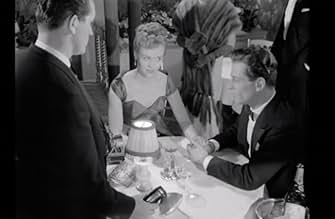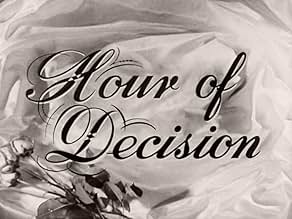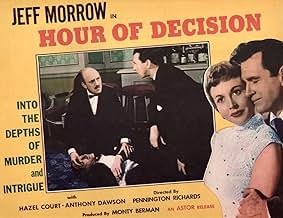An American journalist solves the mystery of an unpleasant columnist's murder and clears his own wife, one of the many suspects.An American journalist solves the mystery of an unpleasant columnist's murder and clears his own wife, one of the many suspects.An American journalist solves the mystery of an unpleasant columnist's murder and clears his own wife, one of the many suspects.
- Director
- Writers
- Stars
- Director
- Writers
- All cast & crew
- Production, box office & more at IMDbPro
Featured reviews
Anthony Dawson is a society columnist at the London night club he has made famous. He gets up to wander the tables, then sits down. When he gets up, he collapses, dead. The police, in the person of Carl Bernard, investigate. Newly wed reporter, Jeff Morrow (playing an alien instead of fighting them in scifi flicks) offers to help, and Bernard is agreeable. Morrow has more motive than a story; his wife, Hazel Court, is a suspect, although no one knows her name; she had been Dawson's lover before her marriage, and was trying to get some letters back.
It's a well constructed mystery, with Morrow wandering around, interviewing suspects, and as is usual, everyone had plenty of motive to kill Dawson. There's also some good outdoor photography by cinematographer Stanley Pavey as Morrow wanders past several landmarks, including the Fire monument, Buckingham Palace -- with the soldiers marching past -- and Picadilly Circus. C. M. Pennington-Richards directs efficiently, with a few tics standing in for character traits. Lionel Jeffries and Michael Balfour have nice little roles.
It's a well constructed mystery, with Morrow wandering around, interviewing suspects, and as is usual, everyone had plenty of motive to kill Dawson. There's also some good outdoor photography by cinematographer Stanley Pavey as Morrow wanders past several landmarks, including the Fire monument, Buckingham Palace -- with the soldiers marching past -- and Picadilly Circus. C. M. Pennington-Richards directs efficiently, with a few tics standing in for character traits. Lionel Jeffries and Michael Balfour have nice little roles.
Despite an impressive cast list, this British murder mystery is strictly hokum, a B-picture justly forgotten by modern audiences. It tells the tale of a ghastly gossip columnist - you know, like those ones who write for The Sun - who's murdered at a posh restaurant. An investigative journalist (American star Jeff Morrow, of THE GIANT CLAW fame) decides to solve the case by going through the suspects in turn.
About the only thing this production has going for it are the cast members. There's Hammer starlet Hazel Court, as winsome as ever as the journalist's beautiful wife. Anthony Dawson is the snide murder victim. Arthur Lowe pops up in a cameo, Marne Maitland is reduced to playing a waiter, and Lionel Jeffries bags a largish role too.
Unfortunately the rest of HOUR OF DECISION is strictly routine and the murder mystery itself is consistently boring, heavily indebted to the likes of Agatha Christie. It feels sluggish, especially at the climax where all the suspects gather in the club for a final reckoning. The production values are limited and there's no incident or atmosphere to speak of, leaving this completely missable.
About the only thing this production has going for it are the cast members. There's Hammer starlet Hazel Court, as winsome as ever as the journalist's beautiful wife. Anthony Dawson is the snide murder victim. Arthur Lowe pops up in a cameo, Marne Maitland is reduced to playing a waiter, and Lionel Jeffries bags a largish role too.
Unfortunately the rest of HOUR OF DECISION is strictly routine and the murder mystery itself is consistently boring, heavily indebted to the likes of Agatha Christie. It feels sluggish, especially at the climax where all the suspects gather in the club for a final reckoning. The production values are limited and there's no incident or atmosphere to speak of, leaving this completely missable.
Jeff Morrow was never the most engaging of screen stars, and here he is not really any different as he struggles to defend his accused wife "Peggy" (Hazel Court) from charges of the murder of a pretty odious gossip columnist. The only way he can do that is to find the real culprit, and so for seventy minutes we follow a rather well trammelled path in this not very mysterious mystery. Anthony Dawson chips in well as "Bax" (again, he only really had the one gear) and there are a few scenes with Lionel Jeffries before the denouement that, well, it was hardly a shock. It's nice to see Piccadilly Circus in the late 1950s as rationing was ending and Britain's was finally emerging from the austerity of WWII, but otherwise this is just one of those bog-standard crime thrillers that you watch and forget. The title doesn't really do it any favours either.
This whodunit gets off to a good start in Lionel Jeffries' nightclub as we're introduced to slippery, philandering, gossip columnist Gary Bax - Anthony Dawson, every bit as convincingly disreputable as he was in DIAL M FOR MURDER. He staggers out poisoned, and reporter Joe Saunders (Jeff Morrow) assists the police to track down the killer, knowing that their chief suspect is his wife Peggy (Hazel Court) who was being blackmailed by Bax over an earlier affair she'd had with him.
Strangely, chances are ignored to build much suspense around Peggy's predicament and the middle section falls rather flat as Joe and Carl Bernard's authoritative Inspector Gower interview a variety of suspects. The latter is one of the more interesting characters. "My parents had a twisted sense of humour, you won't get my first name out of me" he dryly remarks at one point. Shades of Morse. The plodding investigation and a singularly unconvincing denouement results in the film failing to fulfil its early promise. It's all put together with a certain style and sophistication however and will be enjoyed by those who appreciate British mystery films of the period, especially if they're fans of the glamorous Hazel Court.
Strangely, chances are ignored to build much suspense around Peggy's predicament and the middle section falls rather flat as Joe and Carl Bernard's authoritative Inspector Gower interview a variety of suspects. The latter is one of the more interesting characters. "My parents had a twisted sense of humour, you won't get my first name out of me" he dryly remarks at one point. Shades of Morse. The plodding investigation and a singularly unconvincing denouement results in the film failing to fulfil its early promise. It's all put together with a certain style and sophistication however and will be enjoyed by those who appreciate British mystery films of the period, especially if they're fans of the glamorous Hazel Court.
This 'B' feature murder mystery from Walton Studios would have never have set its sights on cinematic greatness but it really fails to spark into life at any stage. Jeff Morrow plays Joe Sanders, an ex-GI turned reporter, who spends almost the entire 81 minutes of the film trying to disprove the seemingly damning evidence against his wife (played by the lovely Hazel Court, wasted here). The premise is that someone knocked off the odious columnist Gary Bax (Anthony Dawson, enjoying himself as a slimy sophisticate), and of course, the entire cast have plenty of motives.
Morrow rather plods through the motions, most of the time hampered by an oversized raincoat, and a severe case of screen charisma bypass; Carl Bernard as Insp Gower offers some interest as an idiosyncratic detective; the ultimate denouement is a stagey 'crime reconstruction' scene reminiscent of Agatha Christie ( or is it Death in Paradise?) with all the suspects gathered together awaiting judgment.
It's invariably interesting to see who is picking up the smaller parts in these pics - and always great to see Lionel Jefferies, (but why the god awful American accent?) Arthur Lowe (later immortalised as Capt Mainwaring), has a small part as a pompous little man, in this case a Scientist - no one came close to doing it better.
Morrow rather plods through the motions, most of the time hampered by an oversized raincoat, and a severe case of screen charisma bypass; Carl Bernard as Insp Gower offers some interest as an idiosyncratic detective; the ultimate denouement is a stagey 'crime reconstruction' scene reminiscent of Agatha Christie ( or is it Death in Paradise?) with all the suspects gathered together awaiting judgment.
It's invariably interesting to see who is picking up the smaller parts in these pics - and always great to see Lionel Jefferies, (but why the god awful American accent?) Arthur Lowe (later immortalised as Capt Mainwaring), has a small part as a pompous little man, in this case a Scientist - no one came close to doing it better.
Did you know
- Quotes
Tony Pendleton: Mr Gary Bax was immoral, disloyal and thoroughly selfish. I calculate there are at least a dozen other men who feel the way I do, and any one of them who's half-way decent would consider that killing Gary Bax was a public service - like clearing a blocked drain.
- Crazy creditsIn the end credits Arthur Lowe's part is misspelled "Caligraphy Expert".
Details
- Release date
- Country of origin
- Language
- Filming locations
- Piccadilly Circus, Piccadilly, London, England, UK(establishing shot of London's clubland)
- Production company
- See more company credits at IMDbPro
- Runtime
- 1h 21m(81 min)
- Color
Contribute to this page
Suggest an edit or add missing content


























